Dr. Oyun Sanjaasuren: Her Brother’s Keeper, A Global Earth Keeper
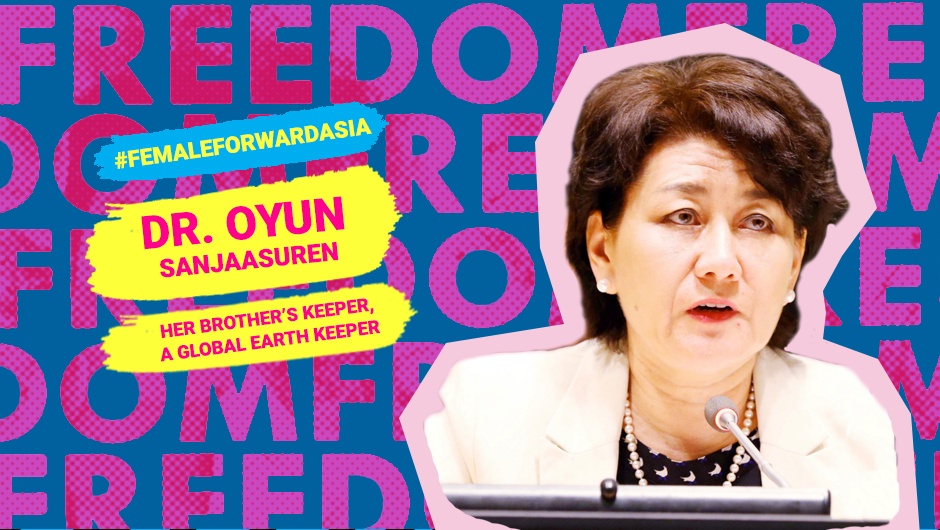
Landlocked between the Soviet Union and the People’s Republic of China, it was not surprising for Mongolia to feel the tremors of Berlin Wall’s collapse in 1989.
Only in his early twenties, Zorig Sanjasaaren was in the forefront of demonstrations in Ulaanbaatar, demanding free elections, the adoption of a multi-party system, the free-market economy and other cherished ideals of liberal democracy.
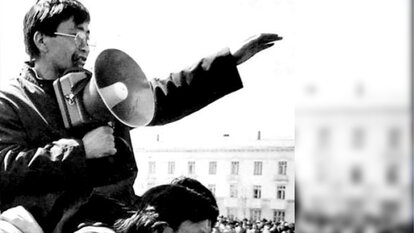
“Zorig was the embodiment of the democratic change which came to Mongolia after more than 70 uninterrupted years of one-party rule,” Tom Garrett (2014) of Democracy Speaks recalled, “He founded the New Generation, young dissidents who spoke out in 1988 for democracy in their country. While never formally part of the Soviet Union, Mongolia was its early satellite state; as the USSR began to come apart at the end of the eighties, Zorig and other young Mongolians seized the opening to demand representative government.”
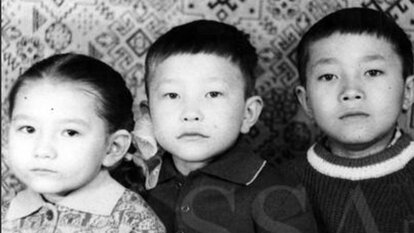
He eventually earned the moniker “Golden Swallow of Democracy” and one of the most iconic pictures of the peaceful Mongolian Revolution of 1990 was Zorig carried by his supporters calming a large, tense crowd in Sukbaatar Square as protesters scuffled with the police forces of the communist government.
Zorig was elected to the parliament, first as a member of the minority, then as part of the Democratic Union which formed the first democratic government in Mongolia since the one-party rule of the communists in 1921. In 1998, he became Minister of Infrastructure and many believed he would eventually become Prime Minister. In that same year, he was assassinated.
Zorig’s murder remains cloaked in mystery and a closed trial rendered an unconvinc- ing verdict two decades after the crime. “Our family has asked for a declassifying of the case and we have been calling for [an] open hearing,” Oyun stated on January 2017. “The requests have not been met. We do not think the case has been fully solved or closed” (Hornby, 2017).
Given her impressive academic record, Oyun was gainfully employed by two multinational corporations as a geologist with a Mongolia-Czech joint venture exploration project and Rio Tinto, a British firm (Global Water Partnership, 2016). She was in London when Zorig was murdered.
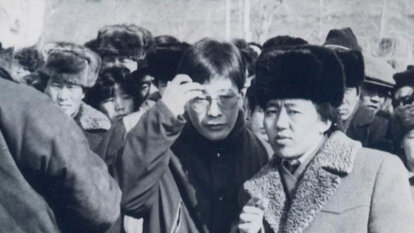
Zorig’s martyrdom became the impetus for his younger sister to leave the financially rewarding corporate world for something uncertain, or even dangerous. She left her cushy job in London and returned to Ulaanbaatar. She immediately jumped into the murky wa- ters of Mongolian politics and continued her brother’s work through political activism and social advocacies. But her multifaceted accomplishments are beyond those of continuing her late brother’s legacy.
A geochemist by profession and training, she earned her doctorate in Earth Sciences from Cambridge University, as well as her bachelors and masters in Geochemistry from Charles University in Prague. The tumultuous events arising from both the Mongolian Revolution and the martyrdom of her brother were a far cry from the tranquility of European academia and the relative calm and stability of the corporate world of the West. Like a Phoenix, she rose from the ashes of family tragedy, left her comfort zone, and flew home.
She ran and won Zorig’s parliamentary seat and became Minister of Foreign Affairs and Minister of Environment. But Oyun’s one important political legacy is the foundation of her own political party. “In 2000, I founded Mongolia’s Civil Will Party. We ran on a platform of good governance and clean politics. This idea was completely new to Mongolian politics at the time,” she recalled in a Huffington Post interview (Ward, 2017).
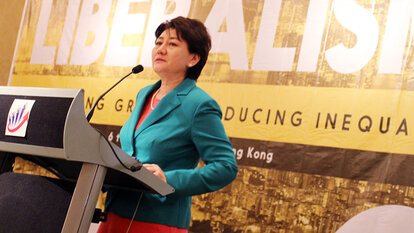
The Civil Will Party was inspired by the prodemocratic ideals and reformist principles of Zorig, later merging with the Green Party to form the Civil Will-Green Party. Anchored on green liberalism as its ideology, the party’s belief in the compatibility of the core values of liberal democracy and the environmentalism of green politics is, in a sense, the synergy of the spirits of the Saanjasuren siblings.
Oyun noted that in 2003, policies on gender issues resulted in better laws, including the law on domestic violence that safeguarded women in Mongolia. In education, more or less women are equal in number with men in terms of enrollment. In decision-making, Sanjaasuren said women’s participation has improved. In the Parliament, 14 percent are women. Mongolia also introduced a 20 percent quota for women to participate in elections and because of this, elected women increased from three in 2006 to 11 in 2012. Mongolia also has the National Committee on Gender Equality, chaired by the Prime Minister, which aims to address gender issues in the country (Council of Asian Liberals and Democrats, 2015).
Oyun acknowledged that much improvement is needed so her party also introduced a quota for women. In the rst by-laws of the party, it required 30 percent participation of women in the party structure including important roles in the party council (Council of Asian Liberals and Democrats, 2015).
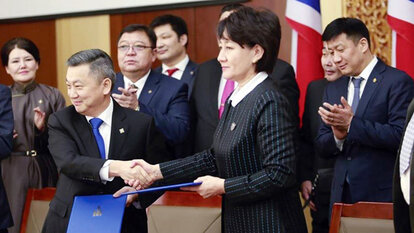
The party recognizes how much populist politics has taken its toll on the country’s political life and economy as it remains a strong advocate of democracy, liberty, justice, human rights, good governance and the free market economy (Asia Pacific Greens, n.d.). It believes in lesser but better government as well as innovation and private sector development.
“Every country has similar problems and these are mainly due to old mindsets that were passed from generations to generations. What is important now is to start challenging those mindsets especially in the aspect of women participation and empowerment,” Oyun stressed.
During a Huffington Post interview (Ward, 2017). Oyun enumerated the challenges and successes she had as party leader, parliamentarian and minister:
In the 2004 elections, our party was invited to be part of a coalition with the Democrats. They agreed to our condition of making good governance part of our joint platform. We then formed the government as part of a grand coalition, which incorporated our platform on good governance into policy. In other words, we were able to put the platform of our small party, with just a small number of seats, into the action plan of the new government.
I offered to chair the working group of the anti-corruption action plan. We had to ght to get the passages we wanted included and at the same time be exible with other parties in the working group. You have to know what you stand for, and you have to be willing to do the grinding, tough work of implementation. As a result, we passed Mongolia’s Freedom of Information Act, the Anti-Corruption Act, and Conflict of Interest legislation. The latter had been my idea right from the beginning. When I initially ran for office in 2001, I was the first Mongolian politician to voluntarily declare my assets. With this legislation, such declarations have become the legal norm. So, getting big ideas onto a party platform is one way to succeed. Of course, it’s not easy. Big ideas need a big conviction.
In the 2012 elections, our party merged with the smaller Green Party, which had fresh new ideas about the environment in their platform. The party that won the most votes o ered to make us part of a new governing coalition. We agreed on the condition that the Ministry of the Environment would become a core ministry. This meant that like Finance and Justice, all new policies would be filtered through the ministry – through a “green lens”.
As party leader in the coalition, I was asked which portfolio I wanted. Of course, I selected Environment and Green Growth. Running that ministry, we were able to turn about 60 percent of our party election program into legislation or government policies. The government passed a Green Growth Development Strategy in 2014. First, local governments received ecosystem service payments for the value of protecting their forests and watersheds. Second, we tripled the water taxes on industrial users (but not citizens). The revenues went directly to the local governments. They were then required to put 50 percent of these revenues into environmental rehabilitation and reforestation of their rural areas. Third, we put in place subsidies and incentive for renewable, clean energy and tech- nology, to help Mongolia move away from coal.
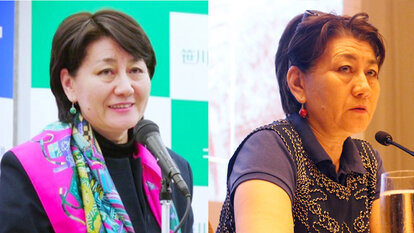
It is not surprising for Oyun to become an environmentalist considering her country of birth. “My native Mongolia—with its long, rich semi-nomadic traditions and lifestyles harmonized with nature—is a country that has contributed minimal green-house gas emissions and yet is experiencing its disproportionate impact,” Oyun wrote in her message in Vulner-Able, From Risk to Resiliency, the CALD book on climate change published in 2014, which the author edited. “The average temperature in my country has risen by 2.1°C, which is three times more intense than the world average level of warming. This has directly resulted in desertification, pasture degradation, water resource shortage, increase of frequency and magnitude of natural disasters and melting permafrost and glaciers that are threatening nomadic pastoralism.”
Furthermore, to the south of Mongolia is China, the biggest producer of greenhouse gas emissions in the world which released more than 9,000 million metric tons in 2015, almost twice as much as the second biggest polluter, the United States (Union of Concerned Scientists, 2015).
Fluent in English, Russian, Czech, and Mongolian, she is an internationalist. With her sterling credentials and global outlook, she eventually headed two United Nations agencies—as the Inaugural President of the United Nations Environment Assembly of UNEPin2016 andChairoftheGlobal Water Partnership two years later. She was recently appointed by the Green Climate Fund as its Director of External Affairs. Oyun is also a member of advisory boards of a number of global initiatives including the Future Earth, Green Growth Knowledge Platform and International Environment Technology Centre of UNEP (Green Growth Knowledge, n.d.). If her national political triumphs are stellar, her feats as a global earth champion are equally spectacular.
In 2014, she became the first female Chair of the Council of Asian Liberals & Democrats (CALD), three years after the Civil Will-Green Party became a full member of CALD. The party is also a member of Liberal International.
Mongolia is an expansive country that is one of the least densely populated, sand- wiched between the former Soviet Union and the People’s Republic of China. During most of the 20th Century, it has become a literal and figurative prisoner of its geography. It was the will and power of the Mongolian people that ended decades of iron rule. And martyrs like Zorig gave up their lives to end Mongolia’s long cold political winter. And now, Mongolia is faced with another global challenge: climate change and global warming. And this time, Zorig’s younger sister, Oyun, had taken the cudgels to fight one of the biggest threats of this millennium.
The Mongol Empire founded by Genghis Khan in the 13th Century was the largest con- tiguous land empire in history covering much of Asia and Europe. But the greatness of new Mongolian leaders like Oyun will not be measured by the extent of territories it conquered, but rather how they are able to conquer the hearts and minds of the Mongolian people to embrace democracy while living in harmony with Mother Nature as the best road to realize their collective dreams of freedom, peace, sustainable development, security and the wellbeing of families and communities.
References
Asia Pacific Greens. (n.d.). History of Civil Will Green Party. Retrieved from Asia Pacific Greens: https://www.asiapacificgreens.org/sites/globalgreens.org/files/Civil%20…
Council of Asian Liberals and Democrats. (2015). Welcome Remarks: Oyun Sanjaasuren. CALD 2015 Conference on Sustainable Development Goals and Post-2015 Development Agenda. (p.45). Ulaanbaatar: Council of Asian Liberals and Democrats.
Garrett, T. (2014, October 02). Remembering Zorig Sanjaasuren, A Leader of Mongolia’s Democratic Movement. Retrieved from Democracy Speak: https://www.democracyspeaks.org/blog/remembering-zorig-sanjaasuren-lead…
Global Water Partnership. (2016, July 01). GWP Chair - Dr. Oyun Sanjaasuren. Retrieved from Global Water Partnership: https://www.gwp.org/en/About/who/Steering-Committee/GWP-Chair/
Green Growth Knowledge. (n.d.). Oyun Sanjaasuren. Retrieved from Green Growth Knowledge Platform: http://www.greengrowthknowledge.org/person/oyun-sanjaasuren
Hornby, L. (2017, January 17). Mongolia seeks answers to killing of independence hero. Retrieved from Financial Times: https://www.ft.com/content/c0b48638-d257-11e6-9341-7393bb2e1b51
Union of Concerned Scientists. (2015). Each Country’s Share of CO2 Emissions. Retrieved from Union of Concerned Scientists: https://www.ucsusa.org/global-warming/science-and-impacts/science/each-…
Ward, T. (2017, June 02). Turning Big Ideas into Meaningful Change. 5 Questions for Mongolia’s Oyun Sanjaasuren. Retrieved from Huffpost: https://www.huffingtonpost.com/entry/turning-big-ideas-into-meaningful-…
_______________________
First published in the book, Compelled by Duty, Conscripted by Destiny, authored by John Joseph S. Coronel, published by the Council of Asian Liberals and Democrats (CALD).